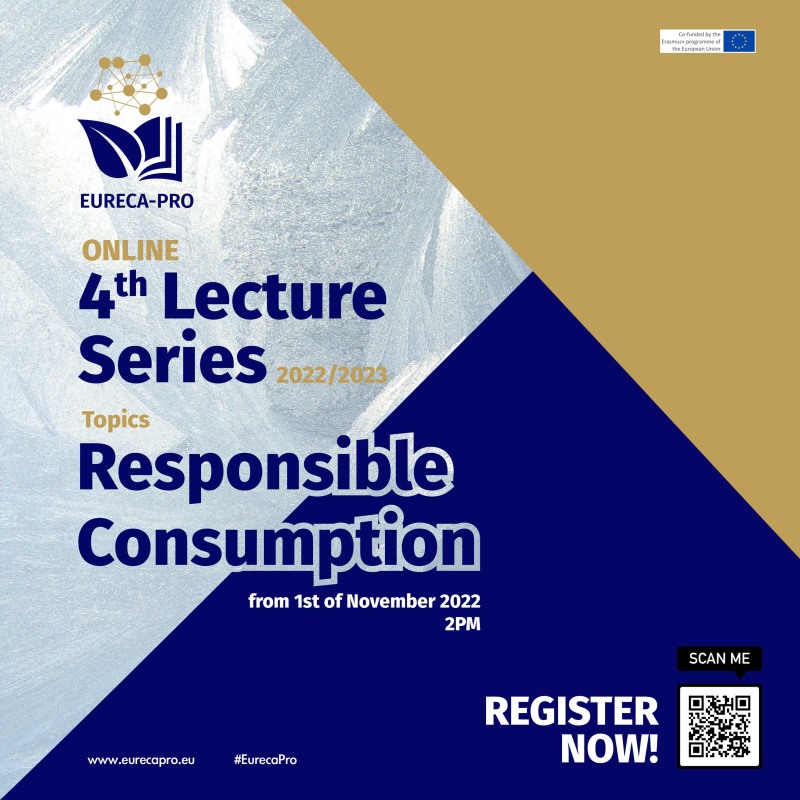Objectives of the Lecture Series
EURECA-PRO – European University on Responsible Consumption and Production is starting the fourth free online lecture series consists of 14 lectures presented by leading professors and researchers.
The Lectures are intended to provide an introduction and initial overview of the multi-faceted nature of responsible consumption and production illustrated by the following thematic areas:
- Sustainable Development Goals
- European Union and Culture
- Responsible Mining Approach
- Circular Economy
- Sustainability and Energy Technologies
- Key role of materials in responsible production
Innovative solutions for current issues of society and industry focusing on United Nation Sustainable Development Goal 12 “Responsible Consumption and Production” are drafted.
The lectures are open for all students, researchers and academic staff.
This lecture series focuses on “Responsible Consumption” and will be presented by 15 leading professors and researchers of nine European universities from eight countries. The lectures are open for students, researchers and academic staff.
Students from EURECA-PRO partner universities can take the series as a free elective and receive five credit points.
Certificates
All participants can get a Certificate of Attendance for each lecture!
The lecture series is one part of the module „Introduction to Sustainable Development Goal 12 in its economic, social, environmental and technology dimensions“. Recognition with 5 ECTS credits can be granted if 11 lectures are attended, an online test is taken at the end and a study paper is written. The paper should comprise 10 pages and show the student’s understanding of SDG 12, describe the major of study and show a research approach towards applications of relevant dimensions of SDG12 to this major.
We will send necessary information and conditions of participation until the end of November to anyone who has expressed interest by registering.
Topics of the 4th Lecture Series
The lecture series 2022/2023 will start in November 2022 and the series will consist of the following 14 lectures on Responsible Consumption with a focus on private household consumption:
Topic
Definition of sustainability within the 21 century
DI. Alexander Griebler,
Montanuniversität Leoben
Topic
Circular Economy for Dummies
Prof. Dr. Tom Kuppens,
Hasselt University
Topic
How green is “green consumption”?
Montanuniversität Leoben
Topic
Creative Re-use
Technical University of Crete
Topic
On the Sustainability of Photovoltaic Solar Energy
Hasselt University
Topic
Analysis of sustainable behaviors through web scraping and artificial intelligence
University Leon
Topic
Digitalization and Responsibility: Authorship, Ownership, and Data Security
Mittweida University of Applied Sciences
Topic
Energy Crisis and Future Cities
Technical University of Crete
Topic
Historicizing Responsible Consumption: Political, Ethical and Cultural Perspectives in the Anglophone World
Université de Lorraine
Topic
An overview of economic ideas on consumption
Université de Lorraine
Topic
Digital technologies in infrastructure design and management
Silesian University of Technology
Topic
Self-generation and self-use of energie (heat, cold and electricity): an overview of frameworks, technologies and their applications
TU Bergakademie Freiberg
Topic
Is glass a sustainable material?
Université de Lorraine
14thFebruary | 11:00–12:30CET
Topic
Shifting Responsibility – A Behavioral Ethics Perspective
Prof. Dr. Gari Walkowitz,
TU Bergakademie Freiberg
16th February | 11:00–12:30CET



